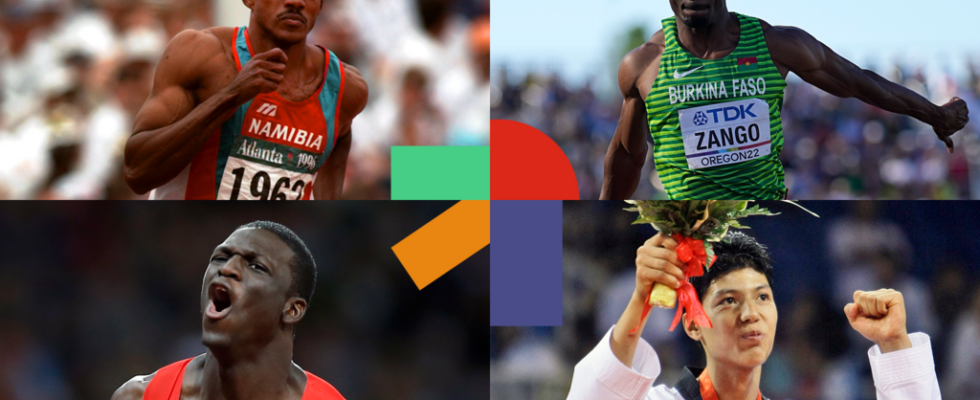As the Paris 2024 Olympic Games approach, the RFI editorial team paints portraits of these medalists who have shed light on their countries, which are unaccustomed to monopolizing the podiums. Today, focus on the Namibian Frankie Fredericks, the Grenadian Kirani James, the Afghan Rohullah Nikpai and the Burkinabè Hugues-Fabrice Zango.
4 mins
Frankie Fredericks, the man who put Namibia on the Olympic map
Eternal second on the podiums, but first in Namibian hearts. Frankie Fredericks did honor to his country, bringing home four of its five Olympic medals (the last was won by Christine Mboma in 2021 in Tokyo). The sprinter first distinguished himself in Barcelona, in 1992, where he won the silver medal in the 100 meters behind Linford Christie and in the 200 m behind Mike Marsh. World champion in the 200m in 1993, Frankie Fredericks, however, came up against stronger opponents than him at the Games. In 1996, in Atlanta, the Namibian struggled, but again settled for silver in the 100m, behind the new world record holder Donovan Bailey. And over 200 m, despite a great time, he again finished in silver behind the untouchable Michael Johnson, who shattered the world record at the time. Absent in Sydney in 2000 due to injury, Frankie Fredericks attempted a final flight in 2004 in Athens. But at almost 37 years old, he failed at the foot of the podium.
Kirani James, the Granada star who lit up London 2012
Grenada, a country of 125,000 inhabitants, has three medals at the Olympic Games. And all of them are around Kirani James’ neck. Already world champion in the 400m among cadets and juniors, the slender athlete burst into limelight at the 2011 World Championships in Daegu, South Korea, where he beat American boss LaShawn Merritt and became world champion, while He’s not yet 19. Although inconsistent, Kirani James arrived at the London Olympics in 2012 with the favorite costume. And he did not tremble in the final to offer his country its first Olympic gold medal. Four years later, in Rio de Janeiro, and after roller coaster performances in the wake of his London coronation, the Grenadian won a silver medal, beaten by the South African Wayde van Niekerk who broke the world record. world. And in 2021, at the Tokyo Games, James finished with a bronze medal. At 31, the sprinter is still ranked well in recent major competitions, and he hopes to bring home a fourth Olympic medal from Paris.
Rohullah Nikpai, Afghan pride
Afghanistan made him a hero. In a country where the Taliban were then far from power, Rohullah Nikpai became a superstar thanks to his prowess at the Olympics. The Afghan gained his first reputation in 2008. Qualifying for the Beijing Games was already a big achievement for the taekwondo player, who spent a large part of his childhood in refugee camps. But Rohullah Nikpai had not come all this way to make up the numbers. As soon as he entered the fray, in the under 58 kilos category, the Afghan scalped the three-time German European champion, Levent Tuncat. Beaten in the quarters by the Mexican and future Olympic champion Guillermo Perez, Nikpai made up for it in the repechage against the British Michael Harvey before beating the double Spanish world champion Juan Antonio Ramos in the match for the bronze medal. A feat celebrated with great fanfare throughout Afghanistan, a country under the spell of its new favorite. Moving to the under 68 kilos category at the following Games in London, Rohullah Nikpai did it again and won a new bronze medal. These are, to date, the only Afghan Olympic medals.
Hugues-Fabrice Zango, Burkina’s great leap forward
In the land of honest men, Hugues-Fabrice Zango is a model. The only Olympic medalist from Burkina Faso, the triple jump specialist had an intense 2021. Constantly progressing since his debut eight years earlier, the Burkinabè struck a major blow in January by establishing the new indoor world record with a jump of 18.07 m, beating the old best mark established ten years earlier. early by his trainer, Frenchman Teddy Tamgho. Announced among the favorites for Olympic gold in Tokyo, Hugues-Fabrice Zango is however struggling to give his full potential. In a “day without”, as he admitted on the RFI microphone, he did not manage to climb to the top step. The Burkinabè only takes the bronze medal, behind the Portuguese Pablo Pichardo and the Chinese Zhu Yaming. A small disappointment which, however, does not prevent him from feeling “ great pride in being the first to bring home a medal for Burkina Faso ” all in “ opening the counter for future generations “. A counter which could very well rise thanks to him, once again, in Paris.
